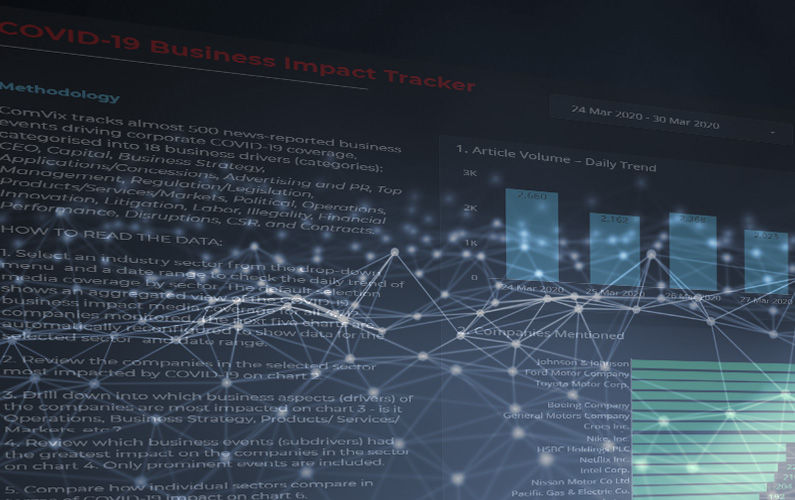As big food chains have started to cautiously reopen parts of their business amid an easing of lockdowns, they are making efforts to prepare for a new normal by introducing measures such as extra space and technology that limits customers’ interactions with staff.
As some commentators put it, the long-term effects of social distancing could mean restaurants will be waking up in a different world, potentially facing a 50% drop in trade even after they fully relaunch.
We decided to use the Commetric COVID-19 Business Impact Tracker to analyse the effects of the COVID-19 crisis on the restaurant sector. Our free tool uses rule-based natural language processing (NLP) and machine learning to track more than 450 types of news-reported business events that affect companies and industries during the pandemic.
We analysed 144,526 articles from 7,859 online media outlets for the period 1 March – 13 May 2020, covering most publicly-traded companies in the US and the UK, and looked into the business drivers that gained the most traction in the media in the context of the COVID-19 pandemic.
Like many other industries such as Food and Drink, Telco, Technology or Aerospace, the most impactful business driver here was Financial performance, which featured articles primarily on financial forecasts and earnings announcements.
For example, many publications reported that sales at Starbucks fell 10% globally in the first three months of the year, most notably in China, where they fell 50% during that period.
In a similar fashion, McDonald’s saw its profit for the first-quarter decline 17% from last year, reflecting weak sales performance due to restaurant closures.
The newsflow around restaurant businesses was also heavily influenced by the Operations driver, with reports about closures of units as the pandemic started to spread and about some reopenings in the recent weeks.
A number of outlets reported that Starbucks had more than 75% of its stores in Japan, the UK and Canada closed, while 98% of stores in China recently reopened with reduced opening hours and seating.
The increased media interest in the Seattle-based coffee chain gave it a significant lead over competitors in terms of traction:
In addition to Financial performance and Operations, the debate around Starbucks was also influenced by the Business strategy driver, as the company temporarily adopted a ‘to go’ model with shortened working hours.
But the chain paused one of its environmental initiatives by stopping the use of reusable cups in an effort to curb the pandemic, which resulted in media coverage within the Disruption and CSR drivers.
Overall, the restaurant industry didn’t score highly in terms of CSR activities – McDonald’s donation of one million N95 masks across Illinois, for instance, didn’t get as much traction as efforts from the Financial Services, Fashion and Health sectors.
However, the restaurant industry performed better in terms of Products/Services and Innovation. For example, as it is trying to recover from the shutdowns, Starbucks rolled out a new plant-based lunch menu in China with Beyond Meat‘s products.
By the way, the vegan start-up Beyond Meat has been the most often mentioned company in the heated media debate around meat alternatives, as our analysis found.
Innovation and Products/Services were the strongest drivers around fast-casual chain Panera Bread, which launched a grocery service that enables customers to order items like milk, produce and bread during the pandemic. The idea was that customers can order essential groceries through Panera Bread’s app and website like they order meals from the restaurant itself.
Others like food service provider Aramark took a different approach towards innovation: the company unveiled a multi-dimensional platform to heighten the protection of everyone it serves by supporting the safe reopening and sustainable management of client locations.
There were also companies which gained their prominence because of the CEO driver. For example, Jose Cil, CEO of Restaurants Brands International, whose subsidiaries include Burger King, Popeyes and Tim Hortons, wrote an open letter about the evolution of the company’s values, which “couldn’t have come at a better time in our company’s history”.
CEO was also the most notable driver around Yum Brands, the parent of Taco Bell, KFC, Pizza Hut and The Habit Burger Grill restaurants. Its Chief Executive David Gibbs agreed to forgo all salary compensation for the rest of 2020 to help pay one-time $1,000 bonuses to the nearly 1,200 restaurant general managers to honour their efforts during the pandemic.

